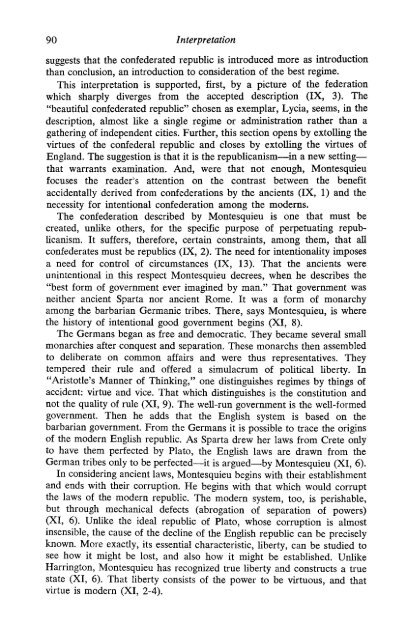philosophy - Interpretation
philosophy - Interpretation
philosophy - Interpretation
You also want an ePaper? Increase the reach of your titles
YUMPU automatically turns print PDFs into web optimized ePapers that Google loves.
90 <strong>Interpretation</strong><br />
suggests that the confederated republic is introduced more as introduction<br />
than conclusion, an introduction to consideration of the best regime.<br />
This interpretation is supported, first, by a picture of the federation<br />
which<br />
sharply diverges from the accepted description (IX, 3). The<br />
"beautiful confederated<br />
repubhc"<br />
chosen as exemplar, Lycia, seems, in the<br />
description, almost hke a single regime or administration rather than a<br />
gathering of independent cities. Further, this section opens<br />
by extolling the<br />
virtues of the confederal republic and closes by extoUing the virtues of<br />
England. The suggestion is that it is the republicanism in a new setting<br />
that warrants examination. And, were that not enough, Montesquieu<br />
focuses the reader's attention on the contrast between the benefit<br />
accidentally derived from confederations by the ancients (IX, 1)<br />
the moderns.<br />
and the<br />
necessity for intentional confederation among<br />
The confederation described by Montesquieu is one that must be<br />
created, unlike others, for the specific purpose of perpetuating repub<br />
licanism. It suffers, therefore, certain constraints, among them, that aU<br />
confederates must be republics (IX, 2). The need for intentionality imposes<br />
a need for control of circumstances (IX, 13). That the ancients were<br />
unintentional in this respect Montesquieu decrees, when he describes the<br />
man."<br />
"best form of government ever imagined by That government was<br />
neither ancient Sparta nor ancient Rome. It was a form of monarchy<br />
among the barbarian Germanic tribes. There, says Montesquieu, is where<br />
the history of intentional good government begins (XI, 8).<br />
The Germans began as free and democratic. They became several smaU<br />
monarchies after conquest and separation. These monarchs then assembled<br />
to deliberate on common affairs and were thus representatives. They<br />
tempered their rule and offered a simulacrum of political hberty. In<br />
"Aristotle's Manner of Thinking," one distinguishes regimes<br />
by things of<br />
accident: virtue and vice. That which distinguishes is the constitution and<br />
not the quahty of rule (XI, 9). The weU-run government is the weU-formed<br />
government. Then he adds that the English system is based on the<br />
barbarian government. From the Germans it is possible to trace the origins<br />
of the modern English republic. As Sparta drew her laws from Crete only<br />
to have them perfected<br />
by Plato, the Enghsh laws are drawn from the<br />
German tribes only to be perfected it is argued by Montesquieu (XI, 6).<br />
In considering ancient laws, Montesquieu begins with their establishment<br />
and ends with their corruption. He begins with that which would corrupt<br />
the laws of the modern republic. The modern system, too, is perishable,<br />
but through mechanical defects (abrogation of separation of powers)<br />
(XI, 6). Unlike the ideal repubhc of Plato, whose corruption is almost<br />
insensible, the cause of the decline of the English republic can be precisely<br />
known. More exactly, its essential characteristic, liberty, can be studied to<br />
see how it might be lost, and also how it might be established. Unlike<br />
Harrington, Montesquieu has recognized true<br />
liberty<br />
and constructs a true<br />
state (XI, 6). That liberty consists of the power to be virtuous,<br />
virtue is modern (XI, 2-4).<br />
and that
















